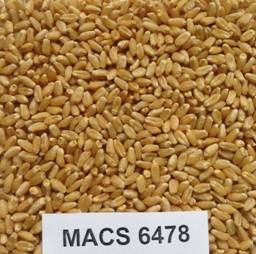Wheat Variety MACS 6478 | 16 Oct 2020
Why in News
The wheat variety called MACS 6478 has doubled the crop yield for farmers in Karanjkhop, a village in Maharashtra.
Key Points
- Developed By: Scientists from Agharkar Research Institute (ARI), Pune- an autonomous institute of the Department of Science and Technology (DST).
- Features:

- A common wheat or bread wheat (Triticum aestivum).
- Other popular wheat varieties are durum wheat (T. durum) and club wheat (T. compactum).
- Hybrid Crop, i.e. produced by the cross-breeding of two genetically different varieties or species. Hybrids are often spontaneously and randomly created in nature when open-pollinated plants naturally cross-pollinate with other related varieties (not genetically modified).
- Matures in 110 days and is resistant to most races of leaf and stem rust.
- This is against the normal maturing attained after 140 to 150 days, required for wheat varieties cultivated commonly in northern India.
- This amber colored medium sized grain contains 14% protein, 44.1 ppm (parts per million) zinc and 42.8 ppm iron which is higher than other cultivated varieties.
- Farmers get a yield of 45-60 quintal per hectare with the new variety as against earlier average yield ranging 25-30 quintal per hectare when they cultivated Lok 1, HD 2189 and other old varieties.
- A common wheat or bread wheat (Triticum aestivum).
- Other ARI Wheat Variety (MACS 4028):
- This bio-fortified durum variety has very high protein (14.7%), iron (46.1 ppm) and zinc (40.3 ppm) content, compared to the corresponding levels of 8-10%, 28-32 ppm and 30-32 ppm in normally-grown varieties.
- Biofortification is the process by which the nutritional quality of food crops is improved through agronomic practices, conventional plant breeding, or modern biotechnology.
- Maturing in just over 100 days, it is suitable for cultivation in rainfed and low fertility conditions in Maharashtra and Karnataka.
- It was chosen for a UNICEF-funded Farming System for Nutrition project, operated through the Indian Council of Agricultural Research’s (ICAR) Krishi Vigyan Kendras (KVK), as part of the National Nutrition Strategy.
- This bio-fortified durum variety has very high protein (14.7%), iron (46.1 ppm) and zinc (40.3 ppm) content, compared to the corresponding levels of 8-10%, 28-32 ppm and 30-32 ppm in normally-grown varieties.
- ARI has also bred MACS 2971, a high-yielding variety of the traditionally cultivated dicoccum (also known as ‘khapli’) wheat that is rich in dietary fibre.
- The Karan Vandana (DBW 187) wheat variety, developed by the Indian Institute of Wheat and Barley Research (IIWBR) under the Indian Council of Agricultural Research (ICAR), is used for cultivation in North Eastern Plains Zones.
Other Recent Activities by ARI
- Found the first synthetic route for producing flavonoids molecules related to the treatment of tuberculosis and chikungunya.
- Found that the colour of Lonar lake water in Maharashtra’s Buldhana district turned pink due to a large presence of the salt-loving ‘Haloarchaea’ microbes.
- Mapped two alternative dwarfing genes Rht14 and Rht18 in wheat that can help in reducing rice crop residue burning i.e. stubble burning.
- Isolated and cultivated 45 different strains of methanotrophs (methane-utilising bacteria) and created the first indigenous methanotroph culture.
- A study on biogenic methane hydrate in the Krishna-Godavari (KG) Basin.
